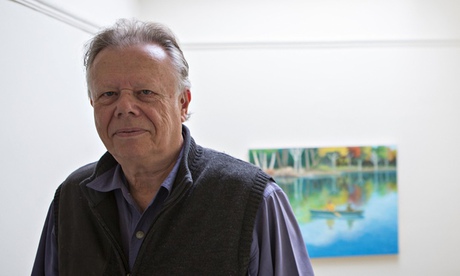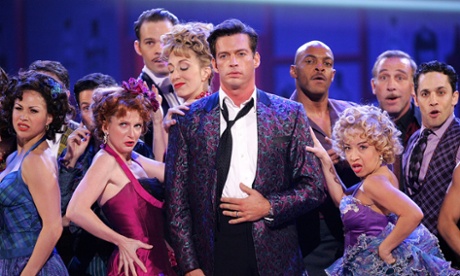
The joy ride was John Lahr’s tenure as the New Yorker’s theatre critic, which recently ended. Now, still eager to be transported, he uses this collection of reviews and profiles written for the magazine to propound a creed of happy-clappy uplift. The theatre, he declares, performs feats that defy the laws of physics: it banishes gravity and stops time in its tracks. The raucous standing ovations that are now almost automatic on Broadway testify to something like a resurrection, as the slumped, weary bodies of theatregoers – “a community of seekers”, like a congregation – are jazzed into vitality all over again.
Lahr is forever leaping to his feet and vaulting skywards. His review of the musical Carousel concludes by quoting St Teresa, who mystically, or maybe nonsensically, remarked that “all the way to heaven is heaven”: imagine a vertical chorus line, tap-dancing towards transcendence. When the razzle-dazzle choreographer Susan Stroman tells Lahr that “joy saves you”, we are probably meant to overhear a desperate religiosity in the verb she uses.
This joy is not to be confused with mere enjoyment. Lahr sniffs at our “delirium of distraction” and mistrusts the “bogus recipes for happiness” dispensed by most Broadway shows. When the lights are dimmed, he hopes for both “exhilaration and illumination”. At times he cavorts in the aisle – metaphorically of course – like a frenetic holy roller; on other occasions he cultivates a sterner demeanour, puritanically stiff-backed in his pew. Ingmar Bergman’s production of Mishima’s Madame de Sade, he reports, is “one of the most noble evenings I’ve ever spent in the theatre” – not, I’d have thought, a recommendation to be emblazoned across the marquee.
Once, at least, the revelation Lahr craves turns out to be robustly carnal, which gives the lie to his high‑mindedness. He ends his review of The Pajama Game with the italicised reaction of his female companion as the crooner Harry Connick Jr unveils his pecs: “Oh … my … God!” she gasps. Lahr calls actors “athletes of the spirit”, but Connick’s burnished chest owes more to gymnastics than to soulfulness. While we wait to be illuminated, where’s the harm in a little pleasant titillation?

Lahr believes that the theatre “teaches through joy”, and one of his recurrent themes – teachy, even preachy, and pretty joyless – is a critique of American individualism, which leads him from Clifford Odets’s boxer in Golden Boy and the pugnacious Biff in Arthur Miller’s Death of a Salesman to David Mamet’s hustlers in Glengarry Glen Ross, Sam Shepard’s cowboys in True West, and the foul-mouthed Roy Cohn in Tony Kushner’s Angels in America. Lahr deplores the rages and rampages of these brutes; then, discussing Tennessee Williams, he acclaims the same laissez-faire egomania as a “romantic vision of self-aggrandisement”, the spectacle of “Homo Emancipatus” at play. Sound and fury, violence and bad behaviour are the very life of the theatre, and Lahr can’t quite reconcile these dangerous delights with his earnest need to be educated, ennobled and, if possible, redeemed.
Like all elderly gents, Lahr bemoans “the death of culture” and solemnly prophesies that “civilisation dies not with a bang or a whimper but a sneer”. Our “time of terror” alarms him, although its threat gives the theatre – which for him is “not only a demonstration of courage but an engineer of it” – an “extra social valence”. Yet do the bright, brash lights of Broadway really make up for the dust, rubble and putrid smoke of the toppled World Trade Center? Lahr’s thespian gospel often sounds hyped-up, even hysterical. He applauds the “visionary and psychological prowess” of his favourite directors – among them Stroman, whose recent Metropolitan Opera production of The Merry Widow with Renée Fleming exuded carbonated gaiety, not genuine joy. Then, abruptly changing the rhetorical register, he adds that Stroman and her colleagues are in the business of “being sensational”. Forget the lofty talk about moribund civilisation: this is showbiz, and whatever you like must be absolutely fabulous.
Rather than defending the ramparts, Lahr is negotiating the schmoozy by-ways of lovey-doveydom. His father was the comedian Bert Lahr, which makes him, he says, “a son of cultural royalty”. The princeling is also a player, on matey terms with many of those whose work he reviews. Wallace Shawn, referred to here as Wally, was even cast as Lahr in Prick Up Your Ears, the film of his Joe Orton biography; in addition, Shawn’s father, as Lahr more than once ceremoniously reminds us, used to edit the New Yorker. Bravos ricochet to and fro across the footlights: Lahr writes long, admiring profiles of Kushner and Nicholas Hytner, who reciprocate by dashing off effusive blurbs for this book. It all sounds cliquey, not communal, a huddle of chums, not a welcoming, ecumenical church. Is the theatre a cultural bulwark or a croneyish subculture, held together by kissy endearments and the exchange of favours?
Joy Ride: Lives of the Theatricals is published by Bloomsbury (£30). Click here to order it for £24.







